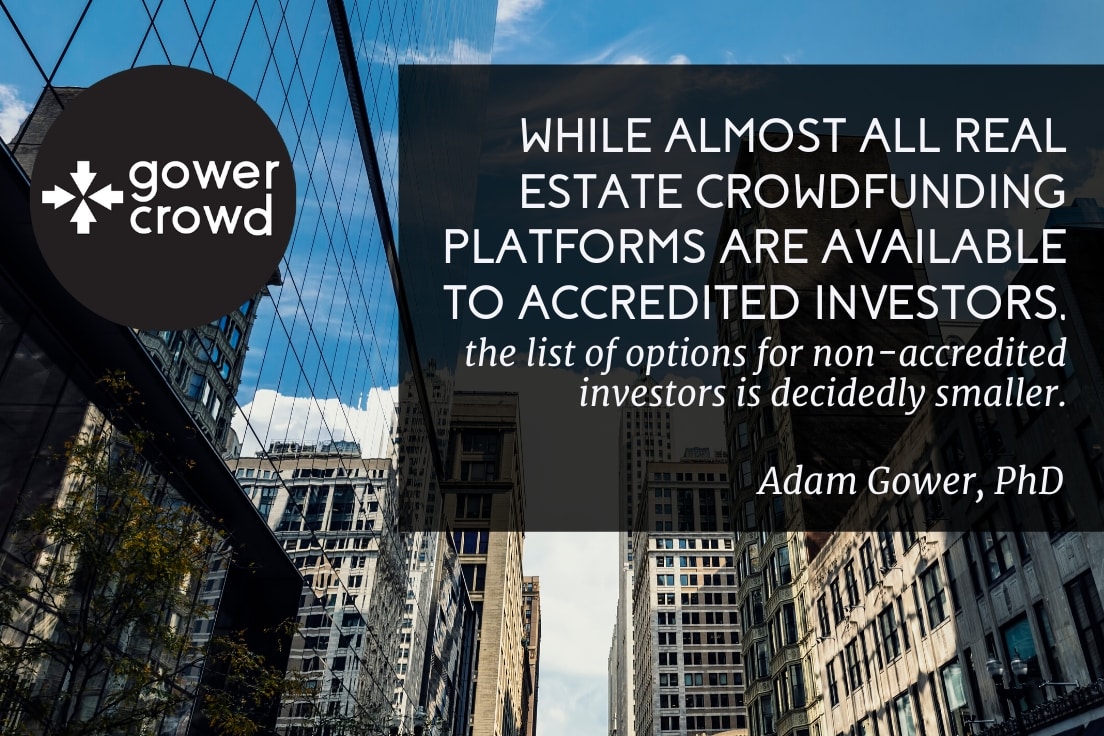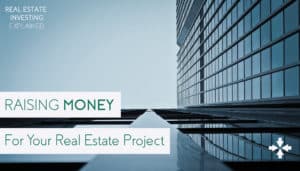FREE TRAINING
What is Real Estate Crowdfunding?
Learn how to build wealth and earn passive income in real estate while someone else does all the work.
What You Need to Know About Non-Accredited Real Estate Crowdfunding
Jump To:
-
- What is Real Estate Crowdfunding?
- What is a REIT?
- Equity Crowdfunding and the JOBS Act
- The Pros and Cons of Real Estate Crowdfunding
- Accredited vs. Non-Accredited Investor
- Investment Limitations for Non-Accredited Investors
- Real Estate Crowdfunding Platforms for Non-Accredited Investors
- Speak to a Financial Advisor
- Conclusion
If you’re even casually familiar with the investment arena, you’ve likely come across more than a few real estate crowdfunding sites. There is a common misconception that real estate crowdfunding deals are limited to high net worth, wealthy accredited investors. This is far from the truth, with many of the most visible crowdfunding platforms seeking out non-accredited investors with a wide variety of real estate investment opportunities. Before you join a real estate crowdfunding platform or make an investment, it is critical that you develop a firm understanding of the space.
What is Real Estate Crowdfunding?
Real estate crowdfunding is a method of raising capital for real estate investments through crowdfunding, which refers to raising small amounts of money from a large number of people, usually via online platforms. By utilizing real estate crowdfunding, investors can deploy capital into a wide range of properties instead of a single large purchase, and developers can finance projects from a wide range of investors rather than from just a few. For investors, it also offers the added benefit of not having to deal with sourcing, acquiring, and managing commercial real estate on your own.
What is a REIT?
A REIT, or 'Real Estate Investment Trust' is a corporation that owns and manages real estate properties and/or mortgages. They operate in a manner similar to stocks, and anyone can purchase shares in a publicly traded REIT. There are also privately traded REITs which usually have higher capital requirements or require investors to be more sophisticated “accredited” investors.
The primary benefit offered by REITs is their liquidity; they trade just like stocks and bonds. Investors can access cash through the sale of a REIT quickly when compared to physical real estate assets like single-family homes, multifamily buildings, and so on. REITs offer exposure to every real estate property type, from multifamily to retail to industrial options.
Want more information about REIT and real estate crowdfunding? Check out Gower Crowd today!

Equity Crowdfunding and the JOBS Act
Real estate crowdfunding has existed in some form for decades. However, it has historically been the province of the uber-wealthy. Deals were made in smoke-filled back rooms or over a game of golf at the country club. The 2012 JOBS Act changed all of that. Provisions in the much-touted Act opened the gates for investors of all capital levels to invest in crowdfunded real estate projects. In addition, the JOBS Act allowed sponsors to leverage the power of digital platforms to connect directly with potential investors.
The Pros and Cons of Real Estate Crowdfunding
Like any investing avenue, there are pros and cons to real estate crowdfunding. Let’s take a look at some of the positive and not so positive qualities of real estate crowdfunding.
Pros
-
- Easy access to a wealth of investment opportunities which is great for diversification within your real estate portfolio compared to acquiring a single large asset.
-
- Much like traditional equities/stockbrokers, there are multiple options for crowdfunding platforms, all with their own list of pros and cons. (we’ll take a look at a few of these a little later).
-
- Real estate crowdfunding platforms often act as aggregators of information related to the opportunities in question, much like Yahoo Finance or Marketwatch does with traditional stocks, commodities, and other investments. This makes accessing information about an opportunity or market much easier and is of great benefit while performing due diligence.
Cons
-
- There are numerous crowdfunded real estate platforms out there, so choosing the right one can be a daunting task for new investors.
-
- Crowdfunded deals simplify real estate investment, which on its face is good but which, in reality, can trip up less-sophisticated investors who may not understand the risk and rewards presented by a particular deal.
-
- The nature of crowdfunding platforms and their digital nature may obfuscate the true nature of a deal. Understanding the details of a real estate investment opportunity is very important but in the Digital Age, it’s easy for investors to just hit ‘I Agree’ or ‘Invest Now’ without getting deep enough into the nitty gritty of a project and its risk/reward profile.
Learn more about different real estate investment opportunities with Gower Crowd
Accredited vs. Non-Accredited Investor
Many real estate crowdfunding platforms or opportunities are restricted to accredited investors, while some are open to both accredited and non-accredited investors. But what’s the difference between the two?
An accredited investor is one who has a special status within the framework set forth by financial regulators. The exact requirements in the United States to qualify as an accredited investor are that one must:
Have a net worth of $1,000,000, not including the value of your primary residence
OR
Have an income of at least $200k per year for the past two years, or $300k for a married couple. If using income to qualify the investor must also expect to make the same amount in the upcoming year.
This standard was first promulgated in 1982, changed in 2012 to exclude primary residence from the net-worth calculation and added to in 2020 by expanding the definition beyond the 'wealth and income as a proxy for education,' to actually including education as a qualifier.
Until 2020, only those with a certain level of income or of a certain net worth qualified, as defined above (and with some other minor exceptions) as an accredited investor, but by adding, among other categories, people holding Series 7, Series 65, and Series 82 licenses as well as investment advisors registered with the SEC or by a state, the SEC determined that being well informed - having the right educational qualifications - also counts.
If any of these categories describes you, you are likely to qualify as an accredited investor. Conversely, if you do not meet one of the requirements above, you are probably a non-accredited investor.
Investment Limitations for Non-Accredited Investors
Non-accredited investors have limitations placed on their investment choices for their safety. After the 1929 crash, the SEC, or Securities and Exchange Commission, put rules in place to prevent average, less sophisticated investors from engaging in complex investments that they might not understand or might not be capitalized enough to invest in safely. These limitations include:
- Investors with an annual income or net worth of below $100,000 can invest up to the greater of $2,000 or the lesser of 5% of your net worth or income.
- If your annual income or net worth exceeds $100,000 you can invest as much as 10% of your total income or net worth, whichever is less, with a cap of $100,000 invested total.
Each crowdfunding site will also have investment minimums and rules and procedures regarding accredited and non-accredited options, with the larger and/or riskier investment opportunities typically limited to accredited investors. Many of these sites also offer non-accredited investors options to invest also by using different regulations than those they would use for accredited investors. These regulations, typically either Regulation CF, which stands for ‘CrowdFunding’, or Regulation A+, which has been dubbed the ‘mini-IPO’ regulation, are structured to provide far greater protections for investors than those limited only to accredited investors.
Related: Real Estate Crowdfunding: Is It Legal? How It Got That Way

Real Estate Crowdfunding Platforms for Non-Accredited Investors
While almost all real estate crowdfunding platforms are available to accredited investors, the list of options for non-accredited investors is decidedly smaller. We have compiled a list of five prominent crowdfunding platforms that offer investment opportunities for those investors who currently satisfy only the non-accredited investor status.
1. Fundrise
Fundrise is perhaps the most prominent of the major crowdfunding platforms, with a heavy presence online and in financial media like CNBC, WSJ, Barron’s, etc. Their high stature is in part due to the fact that they were one of the first to adopt crowdfunding to finance real estate, launching (actually) in 2010 before even the JOBS Act was passed, and entering the eREIT space in 2015. Currently, Fundrise has three public offerings for unaccredited investors and is planning on expanding that lineup pending guidance from regulators regarding easing access rules on crowdfunding opportunities for less-capitalized or lower-income investors.
This platform is attractive for a number of reasons, including low minimum investments, the fact that it is open to all investors, and the easy to use user-interface and great website. IRA accounts are also available at Fundrise, which draws in retirement savers looking to maximize their tax advantages. Some of the drawbacks of using this platform (and other real estate crowdfunding platforms) include the fact that most opportunities are highly illiquid, with difficult to understand fees. Remember that these are complex investments that require rigorous due diligence.
2. RealtyMogul
Next on our list is RealtyMogul.com. Much like Fundrise, this crowdfunding platform uses the updated securities exemption regulation A+ to give both non accredited and accredited investors the ability to invest in real estate projects. Their CEO, Jilliene Helman, stresses their desire to enable investors to connect with unique real estate investments that fill a need not being met by traditional equities, bonds, commodities, etc. The minimum investment for a crowdfunded real estate product at RealtyMogul is $1,000, with much more substantial opportunities available for investors who qualify as being accredited.
3. GROUNDFLOOR
GROUNDFLOOR calls themselves a “wealth tech company” that offers investors the ability to purchase high-yield, short-term real estate debt investments, with a focus on the general public rather than high-net-worth and accredited investors. While many crowdfunding platforms where investors purchase equity stakes in real property through funds or eREITS, GROUNDFLOOR’s investment options are underpinned by secured, collateralized real estate debt, with relatively short (12-18 month) terms.
They offer investments as low as $10, and boast of average returns of 10% per year. Additionally, they stress that all investments are secured by real assets; meaning by real estate property. For more information about GROUNDFLOOR’s non accredited real estate investment options, check out their Investor Page. One feature that makes GROUNDFLOOR stand out is their attention to detail and technology. This can be especially attractive for digitally-oriented investors who crave the latest and greatest user interface and data resources.
4. Roofstock
This Oakland-based real estate crowdfunding startup defines its mission as making ownership of investment real estate radically effective, simple, and cost-effective. Their platform is geared toward a wide range of investors, from beginners to global asset managers. Since launching in 2015, Roofstock has surpassed more than $2 billion dollars in transactions. Roofstock offers opportunities for both non-accredited and accredited investors, you can find out more about investor requirements and how their platform works in their FAQ.
One thing to note about Roofstock; they primarily work with single-family properties, so if you’re interested in commercial or multifamily opportunities you may want to consider a different option. This platform offers investors a 30-day money back guarantee in addition to guaranteed rent on vacant properties. See more about their unique guarantee here.
5. Small Change
Small Change describes their mission as a focus on mobility, community, and economic vitality and is one of the only Regulation CF Funding Portals operating in the United States that focuses solely on real estate. They style themselves as a socially responsible investment platform, with projects that tend to orient towards bettering the community in some way, either through revitalization, creating affordable housing, green building, and other similar pro-social investment avenues.
Developers list projects they seek to fund, which are vetted by Small Change staff to ensure compliance with regulations and their mission. Anyone is eligible to invest in their regulation crowdfunding offerings. Like the other platforms on this list, there are also opportunities available exclusively for accredited investors, with some being available to non-accredited investors. If you’re looking for a platform that combines the power of social change with directed real estate investment, Small Change might be one to consider.

Speak to a Financial Advisor
Despite the wealth of information that is available at your fingertips, more is not always better. If you are new to investing or to crowdfunding, it is imperative that you receive the proper education and guidance to make the right decisions for your financial future. Most folk are not expert investors; they work as physicians, business people, and in a whole host of other professional endeavors.
A trusted financial advisor can be the difference between a successful investment, and whatever worst-case scenarios you can imagine. If you are unsure about taking the plunge on any sort of investment, including crowdfunded real estate, consider working with the aid of professional help. You wouldn’t get on an airplane without a licensed pilot, or go under the knife with an uncredentialed surgeon, so why treat your hard-earned capital any differently?
Conclusion
One thing to keep in mind in your search for non-accredited real estate crowdfunding investments – investor protections exist for good reason. Real estate deals are complex and can be challenging for even the most seasoned real estate investors. Just because you can invest, doesn’t mean you should. On the other hand, excessive concern should not be a primary demotivator when you’re making decisions about your financial future; real estate can provide an excellent part of any well diversified investment portfolio when handled prudently.
Armed with knowledgeable allies, the will and ability to carry out rigorous due diligence, and a properly directed strategy, investors can use real estate crowdfunding to diversify their portfolios as well as see growth, even during economic slowdowns. Non-accredited real estate platforms are a great way for new or even seasoned investors to dip their toes into the water before taking the plunge with a more substantial accredited real estate investment project.
Related: The Impact of Crowdfunding on Real Estate Waterfall Structures
If you like this article, check out some of the other resources available to you here...
Newbie
If you want to build your wealth and earn passive income from real estate investing and are looking at deals on marketplace platforms or through developers online, then I recommend you start by the 8 Key Financial terms so you can understand every deal you look at.
The 8 Financial Keys are not only a great way to get started, they are also essential to understanding how you’ll make money in any real estate deal.
You’ll learn the most important financial concepts you need to know in real estate investing that apply to every type of real estate no matter the asset class (office, industrial, residential, hospitality, retail).
Intermediate Investor
If you’ve got some online real estate investments under your belt already and are beginning to receive passive income checks each month, or have been paid off with profit – or (hopefully not) are finding that some deals are not quite panning out the way you expected, then check out this page for a wealth of free resources.
Here I cover everything from beginner all the way to very advanced real estate concepts.
You’ll find podcasts with developers, researchers, professors and other industry experts, detailed articles, and lots of videos, both short and long that are all easily searchable and totally free.
Advanced Investors
I am not shy about being straightforward about real estate investing; it is exciting, lucrative, and can help you build wealth and income as part of your investment portfolio, but it is not without its risks.
As an advanced investor you know this already, so I’ve put together a webinar for you that guides you through one of the most important components of real estate investing: Real Estate Contracts – reading between the lines.
This is advanced learning and based off conversations I had with three of the top real estate attorneys in the country, combined with my own personal experience. Access it here; it could be the most important webcast you watch all year.
RELATED ARTICLES
Real Estate Investing Explained – Raising Capital for Your Real Estate Projects
Last Updated on May 24, 2022 by Dr. Adam Gower FREE TRAINING What is Real Estate Crowdfunding? Learn how to build wealth and earn passive income in real estate while someone else does all the work. Learn More With Support from SmallChange If you’ve got a good project and you’re a professional developer, for the…
READ MORE >Real Estate Crowdfunding: Is It Legal? How It Got That Way
Last Updated on May 3, 2022 by Dr. Adam Gower WHITE BOARD WORKSHOP Need More Money to Finance Your Real Estate Projects? Learn how to find more investors, raise more money, and finance your real estate projects online. Sign Up For The Workshop Real Estate Crowdfunding: Is It Legal? How It Got That Way By…
READ MORE >A Primer on How to Utilize Opportunity Zones
Last Updated on December 16, 2023 by Dr. Adam Gower A Primer on How to Utilize Opportunity Zones By Adam Gower Ph.D. When the Tax Cuts and Jobs Act of 2017 was passed, while the bill itself was a partisan one, there was also a concept with bipartisan origins that came along with it: Opportunity Zones.…
READ MORE >Copyright 2018 - ADAM GOWER PH.D. - All Rights Reserved
Website Disclaimer: All Content contained on this website is intended for informational purposes only and does not purport to be complete or accurate. No recommendations are made or intended to be made regarding investment in real estate of any kind. For further information on any investment opportunity contained in any content of this website, you should visit the respective crowdfunding portal or site where such investment opportunity is published. None of the content presented on this website has been prepared with any reference to any particular user’s investment requirements or financial situation, and you are encouraged to consult with professional tax, legal and financial advisors before making any investment decisions or including the decision to invest at all. GowerCrowd makes no representations or warranties as to the accuracy of any information and accepts no liability or fiduciary responsibility whatsoever. Offers to sell, or the solicitations of offers to buy, any security can only be made through official offering documents through registered portals outside of this website. Investors should conduct their own due diligence, not rely on the financial assumptions or estimates displayed on this website, and are encouraged to consult with a financial advisor, attorney, accountant, and any other professional that can help you to understand and assess the risks associated with any investment opportunity. Neither Adam Gower nor GowerCrowd or any related entities are a registered broker-dealer, funding portal, or investment advisor and does not conduct any activity that would require any registration as such.






